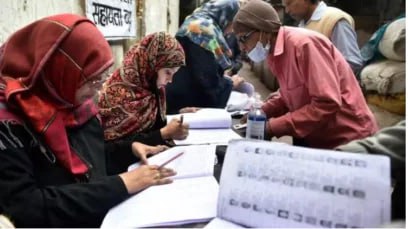Express View on One Nation One Election: No last word
The High Level Committee on Simultaneous Elections, headed by former President Ram Nath Kovind, has unanimously recommended that polls to the Lok Sabha, state legislative assemblies, municipalities and panchayats be held at the same time. This is no surprise. With Congress Leader Adhir Ranjan Chowdhury refusing to participate, the eight-member panel comprised those mostly seen to agree with the government’s views on the proposal. Its terms of reference also carried the presumption that simultaneous polls are in “national interest”. The question, then, is whether the Kovind Committee report has merely rubber-stamped the government’s proposal or if its conclusions are a product of considered deliberations . The report says that the panel invited suggestions and comments from political parties, legal experts, former election commissioners, economists, representatives of business organisations and members of the Bar Council. It says that “the committee carefully considered all the constitutional and legal objections” and its members “studied the relevant legal literature on elections, both in India and abroad”. Unfortunately, in its substance , tone and tenor , the document does not seem informed by “in-depth research and analysis” and “participatory processes”.
Simultaneous elections will impose an artificial unitary character on a federal system of multiple diversities . The report, at best, engages cursorily with this concern. Instead, its 320-odd pages belabour “that separate elections cause a waste of resources, result in policy paralysis and inflict huge socio-economic costs, besides leading to voter fatigue ”. This is only a harkening back to the raison d’etre cited by the government in September last year when it mooted One Nation One Election (ONOE). The document notes that 15 political parties have opposed the move, but there is little by way of engaging with, or addressing , their criticism or that of dissenters like Tamil Nadu Election Commissioner, V Palanikumar, who told the panel that “ONOE could potentially dilute the focus on region-specific challenges and diminish the efficacy of local governance ”. The suggestion of former Chief Justice of the Madras High Court, Sanjib Banerjee — “state funding of elections is a more effective reform to tackle inefficiency ” — finds a mention. So do the concerns of former Chief Justice of the Delhi High Court, AP Shah, “that simultaneous elections hinder political accountability as fixed terms offer representatives unwarranted stability without performance scrutiny .” These compelling arguments have been crunched into a few sentences in the report. Unfortunately, the report does nothing more than dismiss these apprehensions as “ misplaced ”.
Undoubtedly, the Indian electorate is, as the report says, “sagacious enough to differentiate between national and regional issues, as also between national and regional parties”. But ONOE could flatten the political diversity that has marked India’s electoral calendar since the Sixties when the synchronicity of the election calendar was first broken. Much has changed in the Indian polity since then, including the ascendance of regional parties in large parts of the country. The Samajwadi Party’s response underlined the fear that “State-level parties will not be able to compete with national parties in electoral strategy and expenditure”, which too does not seem to adequately draw the attention of the committee. The panel’s report cannot be the last word on a proposal with far-reaching consequences that go beyond political-ideological lines . In days to come, the legitimate concerns of those who disagree must be heard respectfully, and heeded .
